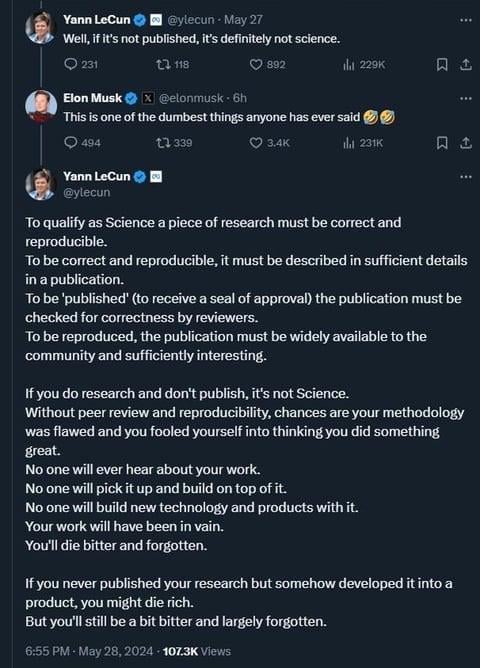this post was submitted on 29 May 2024
1339 points (95.3% liked)
Science Memes
13182 readers
854 users here now
Welcome to c/science_memes @ Mander.xyz!
A place for majestic STEMLORD peacocking, as well as memes about the realities of working in a lab.

Rules
- Don't throw mud. Behave like an intellectual and remember the human.
- Keep it rooted (on topic).
- No spam.
- Infographics welcome, get schooled.
This is a science community. We use the Dawkins definition of meme.
Research Committee
Other Mander Communities
Science and Research
Biology and Life Sciences
- [email protected]
- [email protected]
- [email protected]
- [email protected]
- [email protected]
- [email protected]
- [email protected]
- [email protected]
- [email protected]
- [email protected]
- [email protected]
- [email protected]
- [email protected]
- [email protected]
- [email protected]
- [email protected]
- [email protected]
- [email protected]
- [email protected]
- [email protected]
- [email protected]
- [email protected]
- [email protected]
- [email protected]
- !reptiles and [email protected]
Physical Sciences
- [email protected]
- [email protected]
- [email protected]
- [email protected]
- [email protected]
- [email protected]
- [email protected]
- [email protected]
- [email protected]
Humanities and Social Sciences
Practical and Applied Sciences
- !exercise-and [email protected]
- [email protected]
- !self [email protected]
- [email protected]
- [email protected]
- [email protected]
Memes
Miscellaneous
founded 2 years ago
MODERATORS
you are viewing a single comment's thread
view the rest of the comments
view the rest of the comments

I did follow your link to UC Berkeley (the first one I clicked), and wouldn’t you know it, as I expected, they claim the following:
Huh, look at that. Apparently involving “the scientific community” is part of science.
Again, this is from your link, which you didn’t read, I assume because your patron saint, Dunning-Kruger, frowns on reading.
That's not like a big gotcha, lol... I actually said "Let's go look at that checklist," and had a link to it (in a quote). Those checklist items correspond directly to section headings, and I quoted and responded to the even-more-strongly-worded section heading directly.
In fact, I included it as the best evidence I found for your point: That if I read any textbook on the philosopy of science, it will spell out how "science" is "a particular method of peer review." Well... I found some evidence that kind of points that way, and a whole boatload that suggests that that isn't really thought of as part of the Demarcation Problem. I wasn't going in trying to "be right," that's just what I found.
Like I put quite a bit of work in good faith to try to understand where you're coming from, but I don't feel like you're trying to meet me half way.
Look, here’s my point more concisely: can you name one scientist, just one, whose work isn’t subject to peer review? I can’t think of any. Given that science is ostensibly just the activity that scientists engage in, and all of them do peer review, that’s probably important, right?
When I look around my University I see people doing something, let’s call it “science.” I’d like to define this activity to distinguish it from other, similar activities. The fact that my efforts encounter a Demarcation Problem means the definition is more convoluted than simply “empirical investigation” or “fact finding”. If science could be captured with such broad strokes, there wouldn’t be a demarcation problem!
Elon Musk seems to “think” (and I use this word loosely) that science is when people do experiments or try to figure out the truth, apparently without reproducibility or peer review. But if that were the case, there would be no debate, no demarcation problem, no counter examples.
What we need to do is describe what scientists do that non-scientists don’t do with sufficient rigor to distinguish the two groups. As I said, peer review seems to be an indispensable feature of science. Do you have your own definition or suggestions?
P.S. just for future discussions, please don’t use Wikipedia for philosophy or mathematics. It’s a good resource of dates and names but that’s about it. For philosophy you can use textbooks or the Stanford Encyclopedia.